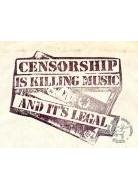While apartheid South Africa had a notoriously elaborate censorship system, few songs were actually banned by the official state censor, the Directorate of Publications. More often than not, it was the South African Broadcasting Corporation (SABC) that functioned as an extension of the government apparatus of repression and surveillance.
The SABC did not ban songs, it simply would not play what it did not want the country to hear. The Central Record Acceptance Committee (CRAC) interpreted the Publications Act of 1974 strenuously and with vigour, meeting weekly to review all music intended for airplay for evidence of anything that failed to comply with government policies. Reasons for a song being rejected – AFGEKEUR - were diligently recorded on lyric sheets:
...seks (sex) – struggle – geweld (violence) – polit.propaganda – godsdiens (religion) – drugs – swak smaak (bad taste) – vloek (swearing) - anti-capitalistic – ANC – afstootlik (repulsive)...
To ensure that these rejected songs didn’t make it onto the air, stickers indicating what to AVOID were then placed on album covers, song titles judged likely to offend were rendered illegible with pen scribbles and vinyl records scratched so that the needle would jump when playing an “offensive” track to the next song on the album.
Unsurprisingly, Shifty was hit hard by these avoidance tactics. Its first release, the self-titled debut from Lesotho band Sankomota, was deemed “undesirable” for flying in the face of the SABC’s “tribal purity” for mixing languages. Other Shifty artists were also muzzled - Koos Kombuis was rejected for mentioning sex and politics, and cursing repeatedly. Johannes Kerkorrel’s damning indictment of white complacency, "BMW", was deemed “repulsive“ and Jennifer Ferguson’s "The Ballad of Black Jack and Crazy Jane" was considered to be in “bad taste.”
It was not only the state that shunned Shifty. Between the revenue-driven self-censorship of record companies, through the impact of the cultural boycott, to the country’ s only cutting engineer stopping the lathe because he didn’t like what he was hearing, finding Shifty in conventional record stores could be a real shopping challenge.
Shifty came up with some ingenious retorts to these silencing strategies – pressing albums by politically overt artists like Kalahari Surfers abroad, then smuggling them back into South Africa, distributing unmarked albums wrapped in brown paper bags through unorthodox channels like bicycle shops, using ironic word play to disguise rebellious intent, even securing Swedish funding to record less radio-friendly artists. However, the lasting legacy of this silencing sadly remains - the significance of the Shifty catalogue still far outweighs its fame.



